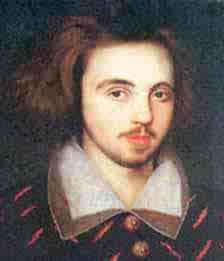Biography of Christopher Marlowe

Christopher Marlow was born in Canterbury as the son of a shoemaker on February 26, 1564. He attended the King's School, Canterbury and Corpus Christi College, Cambridge on a scholarship before receiving his bachelor of arts degree in 1584.
In 1587, Cambridge hesitated to award him with his master's degree because of a rumor of his converting to Catholicism and preparing to be a priest. However, he was awarded the degree and commended him for his "faithful dealing" and "good service" to the queen, some speculate he was a spy, working for Sir Francis Walsingham's intelligence agency, however, no direct evidence proves this theory.
Marlowe's first dramatic work, Dido, Queen of Carthage, was most likely written in Cambridge with Thomas Nashe with his first performed play, Tamburlaine, in London in 1587. Tamburlaine was the first play to use blank verse and marked the beginning of the mature phase of Elizabethan Theatre.
Another play, Edward the Second, was possibly inspired by Shakespeare, and discribed the dethronment of Edward II by his barons and French Queen. At this time, it was very possible Elizabeth I might be dethroned by pro-Catholic forces.
Marlowe's plays were enormously successful in his time, due mostly to that of Edward Alleyn, who was unusually tall for his time and played in numorous amounts of Christopher's plays and who's parts may have been written specifically for him. Marlowe's plays were the foundation of Alleyn's company, the Admiral's Men, throughout the 1590s.
In early May 1593, bills were posted about London threatening Protestant refugees from France and Netherlands who had settled in the city. One, the "Dutch church libel", was written in blank verse and contained allusions to several of Marlowe's plays, all while being signed "Tamburlaine".
On May 11, the Provy Council ordered the arrest of those responsible for the crimes. The following day, Thomas Kyd, Marlowe's colleague, was arrested. His belongings were searched and a fragment of a heretical tract was found. Possibly under torture, Kyd said it belonged to Marlowe. Marlowe's arrest was ordered on May 18.
Marlowe, not in London, stayed with Thomas Walsingham, the cousin of Sir Francis Walsingham.
On May 20, Marlowe appeared infront of the Privy Council and was ordered to "give his daily attendance on their Lordships, until he shall be licensed to the contrary."
Although, Marlowe was murdered on May 30, 1593. It is unknown of what really happened, although in the coroner's report it states he was stabbed above the right eye in an ensuing struggle between him and Frizer. Frizer was pardoned of the crime, stating it was an act of self-defense.
Poems by Christopher Marlowe
- Hero and Leander. An epyllion about an Ancient Greek myth.
- The Passionate Shepherd to His Love. A pastoral lyric showing his hope to return to free love.
Christopher Marlowe Plays
- The Jew of Malta
- Tamburlaine
